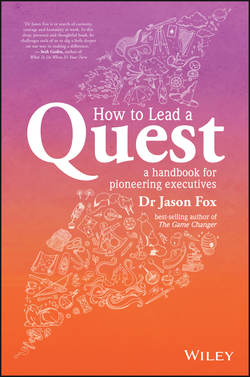Читать книгу How To Lead A Quest - Fox Jason - Страница 12
На сайте Литреса книга снята с продажи.
Part I
Default Thinking and the Kraken of Doom
1
The Anatomy of Default Thinking
PRECEDENTS
ОглавлениеBecause our default thinking relies so heavily on pattern-matching, it can be hard for folks to explore or accept new ideas that lack an established precedent. Leading folks through unprecedented territory, towards a future not yet realised, can be even harder.
Part of leading such a quest is the process of creating precedents. This is where we gather evidence to serve as a reference point for decisions (covered in more detail in chapter 4).
Naturally, the psychology of what informs our thinking is much more complex than the brief tour I've provided. We haven't even ventured into the territory of the identity you form within given social constructs, and how you manage cognitive dissonance in reference to that.
Suffice to say, our default thinking is a comforting, complex thing that favours efficiency and the status quo. Whenever we believe the world makes sense, it's due to our profound ability to ignore our own ignorance.
And so ends our lukewarm homage to Default Thinking.14
It's good, fast and often useful. It forms the basis of our ‘system 1' (fast) thinking. And a heap of leadership, strategy and motivation books out there support a collection of comfortingly familiar thinking around this.
Keep in mind default thinking is primarily formed through pattern matching – the more experience we get, the more patterns we recognise. This, in turn, gives us more codified patterns to call upon, and access to more cognitive shortcuts.15 For formulaic work with predictable outcomes, this is quite a boon – it's what allows us to enhance our mastery of musical instruments, or to accurately predict the outcome of things.
Clever systems exist for more complex phenomena, and handy templates exist for more repeatable phenomena. Both of these constructs serve to guide us through complexity and reduce cognitive burden – instead of having to think too hard, we have a system or template to guide us.
With all of this clever, time-saving stuff, one would think that we would have more time to work on the important stuff – like strategy, progress, and the threats and opportunities that lie on the horizon.
In fact, in an ideal world, we'd invest roughly 80 per cent of our time doing the core work that needs to be done – the default, productive, operational ‘business as usual' work that Ought To Be Got Done, and that only requires fast thinking.
But then everyone would also ensure that a good 20 per cent of their time was engaged in more thoughtful work, and deeper, more thorough thinking. We'd reflect upon our assumptions and the decisions we make. We'd feed our hunches (see chapter 4) and nurture the exploration of new possibilities and options.
This might happen, if we weren't cursed with efficiency.
14
My intention with this opening chapter was actually to be all jolly-like, pointing out the many merits of default thinking. But I fear my disdain for unquestioned thought might have crept in. Oh well! Stay tuned …
15
Assuming we've had diverse experience. If this isn't the case and we've only had more experience doing the same thing, our default thinking may just be that much more ingrained and harder to challenge or budge – hence the need for diversity in leadership. This also highlights the effect that fresh eyes can have – without having a database of patterns to call upon, less experienced folks can often ask good questions, or see things others cannot. At least, until the point at which they become ‘normalised'.
